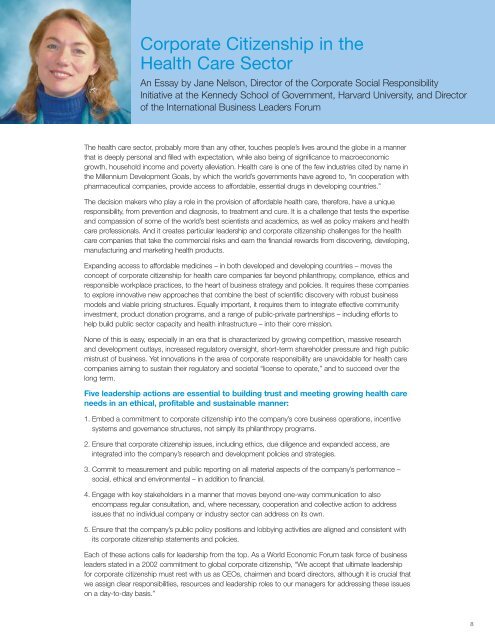Abbott 2004 Global Citizenship Report - Abbott Laboratories
Abbott 2004 Global Citizenship Report - Abbott Laboratories
Abbott 2004 Global Citizenship Report - Abbott Laboratories
You also want an ePaper? Increase the reach of your titles
YUMPU automatically turns print PDFs into web optimized ePapers that Google loves.
Corporate <strong>Citizenship</strong> in theHealth Care SectorAn Essay by Jane Nelson, Director of the Corporate Social ResponsibilityInitiative at the Kennedy School of Government, Harvard University, and Directorof the International Business Leaders ForumThe health care sector, probably more than any other, touches people’s lives around the globe in a mannerthat is deeply personal and filled with expectation, while also being of significance to macroeconomicgrowth, household income and poverty alleviation. Health care is one of the few industries cited by name inthe Millennium Development Goals, by which the world’s governments have agreed to, “in cooperation withpharmaceutical companies, provide access to affordable, essential drugs in developing countries.”The decision makers who play a role in the provision of affordable health care, therefore, have a uniqueresponsibility, from prevention and diagnosis, to treatment and cure. It is a challenge that tests the expertiseand compassion of some of the world’s best scientists and academics, as well as policy makers and healthcare professionals. And it creates particular leadership and corporate citizenship challenges for the healthcare companies that take the commercial risks and earn the financial rewards from discovering, developing,manufacturing and marketing health products.Expanding access to affordable medicines – in both developed and developing countries – moves theconcept of corporate citizenship for health care companies far beyond philanthropy, compliance, ethics andresponsible workplace practices, to the heart of business strategy and policies. It requires these companiesto explore innovative new approaches that combine the best of scientific discovery with robust businessmodels and viable pricing structures. Equally important, it requires them to integrate effective communityinvestment, product donation programs, and a range of public-private partnerships – including efforts tohelp build public sector capacity and health infrastructure – into their core mission.None of this is easy, especially in an era that is characterized by growing competition, massive researchand development outlays, increased regulatory oversight, short-term shareholder pressure and high publicmistrust of business. Yet innovations in the area of corporate responsibility are unavoidable for health carecompanies aiming to sustain their regulatory and societal “license to operate,” and to succeed over thelong term.Five leadership actions are essential to building trust and meeting growing health careneeds in an ethical, profitable and sustainable manner:1. Embed a commitment to corporate citizenship into the company’s core business operations, incentivesystems and governance structures, not simply its philanthropy programs.2. Ensure that corporate citizenship issues, including ethics, due diligence and expanded access, areintegrated into the company’s research and development policies and strategies.3. Commit to measurement and public reporting on all material aspects of the company’s performance –social, ethical and environmental – in addition to financial.4. Engage with key stakeholders in a manner that moves beyond one-way communication to alsoencompass regular consultation, and, where necessary, cooperation and collective action to addressissues that no individual company or industry sector can address on its own.5. Ensure that the company’s public policy positions and lobbying activities are aligned and consistent withits corporate citizenship statements and policies.Each of these actions calls for leadership from the top. As a World Economic Forum task force of businessleaders stated in a 2002 commitment to global corporate citizenship, “We accept that ultimate leadershipfor corporate citizenship must rest with us as CEOs, chairmen and board directors, although it is crucial thatwe assign clear responsibilities, resources and leadership roles to our managers for addressing these issueson a day-to-day basis.”8

















